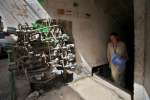UNHCR assists refugees at Greece-FYR Macedonia border, where calm is returning
News Stories, 24 August 2015
GENEVA, Aug 24 (UNHCR) – The UN refugee agency has been helping refugees and migrants amid chaotic scenes in the past few days at the border between Greece and the former Yugoslav Republic of Macedonia as thousands of people tried to cross into FYR Macedonia.
The situation was noticeably calmer and more orderly on Sunday, when almost 2,000 people crossed into FYR Macedonia, and Monday. The majority told UNHCR staff that they had fled the war in Syria, passed through Turkey and crossed by boat to Greece. Among them were many young families with small children.
UNHCR said that more than 10,000 people had reached Serbia since Saturday night after managing to cross from Greece to FYR Macedonia and take a train or bus at the town of Gevgelija.
In Serbia, UNHCR has been supporting the authorities and NGOs to receive and assist the new arrivals at the Presevo transit centre in the south. UNHCR has released limited food stocks for distribution and, in response to a Serbian government appeal, is looking at ways to bring in more supplies, including sleeping mats, blankets, tents and accommodation halls.
In European Union member state Hungary, meanwhile, there was no noticeable increase at the weekend of refugees and migrants apprehended by the police while entering the country. Hungary has received over 120,000 asylum applications so far this year. Many refugees arriving in Hungary wish to reach other parts or Europe because of family links or other reasons.
Border authorities in FYR Macedonia have been struggling to cope with the large numbers of people trying to cross the border, and on Friday and Saturday temporarily sealed the border. UNHCR has, in the meantime, received assurances from the FYR Macedonia government that the border will be open to refugees fleeing conflict in their countries of origin.
In this connection, UNHCR has stressed that there is an urgent need for the authorities to boost their presence and capacity at the border area to ensure a more orderly and protection-sensitive flow. UNHCR is ready to help establish sufficient reception capacity as well as organized registration and identification.
The agency also appealed again to the Greek authorities to enhance registration and reception arrangements for people in need of international protection and to provide urgent assistance to people stranded on the Greek side of the border in tough conditions and help them move to reception facilities deeper inside Greece.
Most of those arriving at the border have suffered immensely before even reaching Greece and need understanding, protection and assistance. UNHCR staff have been at the border since the start, monitoring the situation and helping the vulnerable.
During these days, UNHCR and its partners have delivered food, water, sanitary items as well as plastic sheeting and blankets to the refugees and migrants on the Greek side of the border. Volunteers have also distributed food, water and clothing.
In the FYR Macedonia, UNHCR has worked with the local Red Cross to reunite families separated when crossing the border during the confusion of Friday and Saturday. In addition, UNHCR has been working closely with groups of volunteers to distribute food, water and blankets.
At the Gevgelija railway station, UNHCR has set up a resting point offering refugees protection from sun and rain and its legal team is providing advice and counselling on documentation, registration and asylum procedures for those heading north by train to Serbia. UNHCR has also funded the hire of data entry clerks to support the registration process.
"UNHCR believes more needs to be done by Greece and FYR Macedonia to tackle a problem that will not go away any time soon and affects all of Europe," said Vincent Cochetel, who directs UNHCR's Europe Bureau. "We call again on EU member states to step up help to Greece, FYR Macedonia and Serbia."





































